|
|
|
Sort Order |
|
|
|
Items / Page
|
|
|
|
|
|
|
| Srl | Item |
| 1 |
ID:
187062
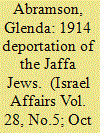

|
|
|
|
|
| Summary/Abstract |
Ahmed Djemal Pasha, Military Governor of the Levant during World War I, instigated two major deportations of Jews from Jaffa during the course of the war, and numerous lesser ones. On 17 December 1914, a day that came to be known as ‘Black Thursday’, the Ottoman ruler of Jaffa, under Djemal’s command, ordered the mass deportation of ‘enemy subjects’, including 6,000 Russian-born Jewish residents of Jaffa. Over the course of the next three months, a few thousand more Russian-born Jews were expelled from Palestine or fled just ahead of the deportations. In total 11,277 Jews were exiled, leaving on various ships that took them from Jaffa to Alexandria. This article describes the ‘Black Thursday’ deportation based on testimonies of those who either witnessed it or were its victims, and briefly on the two works of documentary fiction that provide a rounded context for the many accounts.
|
|
|
|
|
|
|
|
|
|
|
|
|
|
|
|
| 2 |
ID:
175821
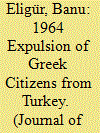

|
|
|
|
|
| Summary/Abstract |
This article argues that the Turkish government facing the 1964 Cyprus crisis applied the principle of negative reciprocity toward Greece and expelled Greek citizens living in Turkey. By doing so, Turkey aimed at pressuring Greece to bring the Greek Cypriot side to the negotiation table. Although Turkish policy proved to be a failure, the expulsions continued. The deportation resulted in the demise of the Greek minority in Turkey for the following reasons: first, there were intermarriages between the Greek citizens and the Greek minority; and second, Turkey’s Greeks finally lost their hope of being treated as equal Turkish citizens.
|
|
|
|
|
|
|
|
|
|
|
|
|
|
|
|
| 3 |
ID:
101284
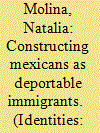

|
|
|
|
|
| Publication |
2010.
|
| Summary/Abstract |
This article draws on archival records of events in California's Imperial Valley in 1940 that resulted in the arrests and deportation of a group of Mexican workers, some of whom were known union activists. The workers had entered the country lawfully and had lived in the United States for years. These immigrants were nevertheless vulnerable because they were receiving treatment for a communicable disease. This, according to immigration officials, rendered them "likely to become a public charge" (LPC), a deportable offense. Officially designating Mexicans as LPCs discredited them at the same time that it circumvented any discussion of possible violation of labor rights or civil rights, both key aspects of government-sponsored reform efforts underway at the time. Constructions of subjects as illegal, diseased, and threats to the nation-state came together in such a way that provided a surefire formula for marking Mexicans as deportable.
|
|
|
|
|
|
|
|
|
|
|
|
|
|
|
|
| 4 |
ID:
194302


|
|
|
|
|
| Summary/Abstract |
Intensive police raids targeted southern German asylum camps in 2018. The police accused black men of rioting against deportation enforcement, and local courts prosecuted numerous individuals. This article examines three such raids as political policing during a time of a strong yet contested state mandate for deportations. Drawing on observations of court proceedings, police and court statements, and ethnographic fieldwork conducted over several years with West African residents of these camps, I analyse how the police and courts intervened in local conflicts over deportation. As these authorities sought to restore deportability, emotions, particularly fear, functioned as a vital supplement to exercising state violence. By criminalizing protest and solidarity among the migrants and spreading fear, the raids drove many to leave the centres. The police and courts also performed fear as they depicted black, dangerous ‘others’ as endangering law enforcement and the ‘Nation’. This contributed to the broader deportation agenda and produced race by normalizing migrants’ exposure to deportation and policing.
|
|
|
|
|
|
|
|
|
|
|
|
|
|
|
|
| 5 |
ID:
155551
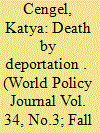

|
|
|
|
|
| Summary/Abstract |
Thousands of mentally ill people residing legally in the United States have been deported after committing crimes as minor as shoplifting. Journalist Katya Cengel reports on Cambodians who fled the country’s killing fields as children and who, after being repatriated, are struggling to make a life for themselves in their unfamiliar homelands. She introduces us to Khe Khoeun, a former refugee now living with relatives in Cambodia, and describes how those with mental health problems are singularly ill-equipped to navigate America’s complicated immigration court system.
|
|
|
|
|
|
|
|
|
|
|
|
|
|
|
|
| 6 |
ID:
191082
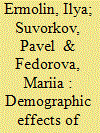

|
|
|
|
|
| Summary/Abstract |
This article explores how the deportation of the Dargin people in the Caucasus affects intergenerational fertility rates and assesses the results of the experiment. The authors paid attention to two Dargin settlements located in the foothills and Mid-Mountains areas of Dagestan, the first of which was subject to forced replacement, but the other was left intact. Inhabitants of both settlements have close kinship ties and are tied by commodity trade as well. The authors obtained data through municipal registers and an additional survey conducted in the studied localities. We used event history analysis as the main methodology. The main findings cover the following: the foothill settlers managed to keep the social norms along with handicrafts that existed before deportation which brought about the intergenerational continuity in procreative behaviour and higher childbirth rates in the foothill settlement that have persisted for a long time.
|
|
|
|
|
|
|
|
|
|
|
|
|
|
|
|
| 7 |
ID:
194303


|
|
|
|
|
| Summary/Abstract |
How are ethics articulated in the organization of migrants’ detention in France? While state agents enjoy discretionary power, it is the third sector that claims legal knowledge and good practice, exposing an unresisting and reverent attitude towards the ‘rule of law’. This legalistic gaze on the state attests to the impasse in questioning (the moral grounds of) laws and flaunting intense emotions on a daily basis, an expression of their moral dilemma. In doing so, police officers, legal practitioners and other service providers display contrasting ideological disapproval but practical compliance, creating an environment infused with melancholy. Melancholy enables them to be humble operators of state rules and regulations and, at the same time, to suffer endless (moral and emotional) pain. This article analyses inter-organizational and inter-personal affective experiences in order to demonstrate how melancholy reflects the morale that is manifest in the organization of migrants’ detention.
|
|
|
|
|
|
|
|
|
|
|
|
|
|
|
|
| 8 |
ID:
084050
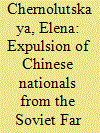

|
|
|
|
|
| Publication |
2008.
|
| Summary/Abstract |
In the past fifteen years or so the history of ethnic deportations in the USSR has been an object of active studies. However, among many publications one can hardly find a special work devoted to the eviction of Chinese nationals from the Soviet Far East in 1938. The main reason for this is the difficulty to find the necessary sources. At present, there is a limited amount of declassified material, including the "special records" of the sessions of the Politburo of the CC AUCP(B),1 several orders of the NKVD of the USSR2 and individual documents in the archives of the Far East. They contain several directives of the central bodies of power and fragmentary information from certain places, but, unfortunately, there are no detailed accounts of the deportation as such and its results.
|
|
|
|
|
|
|
|
|
|
|
|
|
|
|
|
| 9 |
ID:
155760
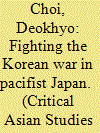

|
|
|
|
|
| Summary/Abstract |
Where does “pacifist” Japan fit within the history of the Korean War? Was Japan simply the beneficiary of the wartime boom – a case best exemplified by Japanese Prime Minister Yoshida Shigeru’s characterization of the Korean War as “a gift of the gods”? When North Korean troops crossed the thirty-eighth parallel and launched a full-scale attack against South Korea, the U.S. occupation in Japan quickly transformed the pacifist nation into the indispensable rear base of United Nations military intervention in the Korean War. The Japanese Communist Party and leftist groups organized by zainichi Koreans (Korean residents in Japan) launched an antiwar movement to stop Japan from producing and sending arms to UN forces in Korea. The U.S. occupation responded with determined efforts to contain every antiwar voice emerging from the streets of the pacifist country. By examining the political dynamics of zainichi Korean and Japanese leftist solidarity and U.S. countermeasures, this article shows how the Korean War was fought in pacifist Japan. It also illuminates how the practice of Cold War containment was mutually linked on the ground between occupied Japan and South Korea.
|
|
|
|
|
|
|
|
|
|
|
|
|
|
|
|
| 10 |
ID:
146092
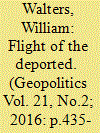

|
|
|
|
|
| Summary/Abstract |
This article calls for studies of migration, borders and deportation to bring the practices and dynamic spaces of transportation more fully into the research frame. While modern deportation is unthinkable without vehicles, transport is a black box for the interdisciplinary literature on the state-enforced movement of population. This article focuses on deportation by air and engages largely with policies and practices relating to the UK deportation experience. It has two aims. First, to offer a critical analysis of the techniques and tactics that are used to turn commercial and charter flights into machineries of deportation. Second, to show that aviation is not a mere instrument that puts deportation policy into practice, but, like other material places in the deportation and detention world, an irreducible zone of knowledges, tactics, and politics. A proper understanding of the deportation complex is radically incomplete without an account of the mobile places of transportation.
|
|
|
|
|
|
|
|
|
|
|
|
|
|
|
|
| 11 |
ID:
149292
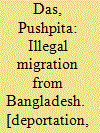

|
|
|
|
|
| Publication |
New Delhi, IDSA, 2016.
|
| Description |
118p.pbk
|
| Series |
IDSA Monograph Series no; 56
|
| Standard Number |
9789382169697
|
|
|
|
|
|
|
|
|
|
|
|
Copies: C:2/I:0,R:0,Q:0
Circulation
| Accession# | Call# | Current Location | Status | Policy | Location |
| 058909 | 304.8/DAS 058909 | Main | On Shelf | General | |
| 058910 | 304.8/DAS 058910 | Main | On Shelf | General | |
|
|
|
|
| 12 |
ID:
130385


|
|
|
|
|
| Publication |
2014.
|
| Summary/Abstract |
This article addresses the migration aspirations of young, lower middle-class Cameroonians living in Anglophone Cameroon. Deportations and prevention campaigns portray the negatives of migration, yet often have little impact because they assume that migrants' aspirations are grounded in the prior success of other migrants. This research takes its lead from the question: Why aren't aspiring migrants in Cameroon discouraged by migration failure? It is based on an ethnographic fieldwork conducted between September 2007 and January 2009 in Buea (South West Cameroon). Since the late 1990s, the desire for a future 'away from home' has come to be expressed in Anglophone Cameroon by aspirations of going to 'bush'. Taking seriously people's conceptions of success and failure in places of departure, the article argues that locally voiced claims of 'global belonging' exert an important influence on migration aspirations. An understanding of deeply rooted migration desires must include an analysis of identity politics.
|
|
|
|
|
|
|
|
|
|
|
|
|
|
|
|
| 13 |
ID:
177890


|
|
|
|
|
| Summary/Abstract |
In a context of sustained political attempts to reduce immigration and increase expulsions from the UK, mixed-immigration status relationships between citizens and precarious foreign nationals have arisen as key sites where the boundaries of national belonging are contested. These families are presented as inherently problematic: complicating the citizen/migrant binary and supposedly pitting family life against national immigration objectives. Drawing on the accounts of British female partners of ‘deportable’ men, the article examines the impact of immigration enforcement on the lives and senses of security and membership of the citizens close to the migrants targeted. It argues that the women discovered longstanding gendered and classed barriers to operationalising their citizenship privileges, which led to reconfigurations of their relationships with their government and understandings of the institution of citizenship. Their accounts illustrate how immigration controls produce and discipline citizens, as well as migrants, exposing the internal hierarchies and conditionalities of citizenship.
|
|
|
|
|
|
|
|
|
|
|
|
|
|
|
|
| 14 |
ID:
182486
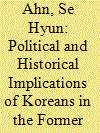

|
|
|
|
|
| Summary/Abstract |
This account of Koreans in the former Soviet Union describes important discoveries concerning a key hidden story of the Korean people and identity. The paper describes important aspects of Korean life in Central Asia that have been relatively undermined by many scholars in international relations and anthropology. This paper presents a detailed analysis of the history and meaning of the settlement of Korean people in Russia and Central Asia from a multitude of perspectives. Despite the size of the Korean population and its significant contributions to the building of Soviet society, very little has been written about Koreans in the former Soviet Union. In fact, the ethnic Korean group has been one of the largest minority groups in the former Soviet Union, representing an important element of both Soviet and post-Soviet political, social, ethnic, and economic history. This study revealed, once again, the tragic story of Stalin’s deportation of Kan people in Russia and explored an intriguing analysis of the re-encounter of Korean and Turkish people after a millennium and their long, intimate cultural bond. In particular, this study demonstrated that the historical and cultural affinities between Koreans and Central Asians existed long before Stalin’s deportation. Political, economic, social, and linguistic exchanges between Korean people and Turkic people are deeply rooted in the same mythology of Dangun, the legendary founder of the first Korean kingdom of Gojoseon. This reflects the dynamics of success of the Korean people in the former Soviet Union as well as their mutual interest in enhancing relations between Korea and the Turkic states and Siberian region.
|
|
|
|
|
|
|
|
|
|
|
|
|
|
|
|
| 15 |
ID:
074643
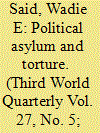

|
|
|
|
|
| Publication |
2006.
|
| Summary/Abstract |
This article examines generally the issue of whether deportation to a country that would almost assuredly torture the individual in question can ever be justified under international law, even when that individual is accused of having links to international terrorism. Specifically, this article provides an analysis of the legal responses of three major common law countries-the USA, Canada, and the UK-in assessing whether or not deportation under such circumstances is consistent with their obligations under international law, and argues that deportation where there is a credible threat of torture can never be countenanced.
|
|
|
|
|
|
|
|
|
|
|
|
|
|
|
|
| 16 |
ID:
189032


|
|
|
|
|
| Summary/Abstract |
In 2019, the tiny West African country of the Gambia imposed a moratorium on all deportation flights from the EU. Though West African countries are notoriously reluctant to cooperate on forced returns, such a moratorium was unheard of and caused an uproar within diplomatic circles in Europe. In the age of deportability, why is deporting ‘unwanted’ migrants an illustration of a nation’s sovereign rights, yet refusing to accept deportees is not? The Gambian government used the moratorium to forestall political destabilization at a time of transition from a long dictatorship. With the moratorium, the government not only sought to protect deportees from violent removal practices but also served the interests of the Gambian population more broadly, among whom deportation remains deeply unpopular. Drawing on original expert interviews and informal conversations carried out between 2017 and 2020, this article shows that the moratorium allowed the Gambia to enact its internal sovereignty through a (temporary) protective exclusion of its citizens. Given the asymmetric and colonial legacy of modern-day sovereignty between states, the moratorium was a legitimate renegotiation of established but questionable standards of interstate sovereignty.
|
|
|
|
|
|
|
|
|
|
|
|
|
|
|
|
| 17 |
ID:
169282


|
|
|
|
|
| Summary/Abstract |
This article explores Mandate Palestine’s immigration policy through the stories of migrants and settled residents who attempted to resist government-issued deportation orders for their removal from the territory. Individuals who lived in and crossed the borders and frontiers of interwar Palestine without the necessary permissions from the mandate government began to negotiate their relationship with the state once they received deportation orders, had their identity documents revoked, or found themselves under arrest. Through a close reading of archival sources including petitions, letters court case extracts and police correspondence, the article argues that Palestine’s immigration and deportation policies caused and exacerbated precarity and dislocation, all of which represented elements of the modern experience of colonial citizenship.
|
|
|
|
|
|
|
|
|
|
|
|
|
|
|
|
| 18 |
ID:
153722


|
|
|
|
|
| Summary/Abstract |
As US deportations and repatriations climbed to unprecedented levels, half of Mexican immigrants deported have at least one family member who is a US citizen, and one in five have at least one child who is a US citizen. This paper applies the analytic of forced transnationality, extending its scope beyond one person’s deportation to reveal cascading effects of travel and trauma for families remaking lives across the US-Mexico border. To do so, our research draws on interviews with mixed-status families, where transnational children have legal permission to reside in the US (including citizenship) and live with caregivers (like parents) who do not. In the wake of the rupture of prolonged detention and deportation, families seek to suture themselves as a collective social subject that is reshaped by forced transnationality.
|
|
|
|
|
|
|
|
|
|
|
|
|
|
|
|
|
|
|
|
|